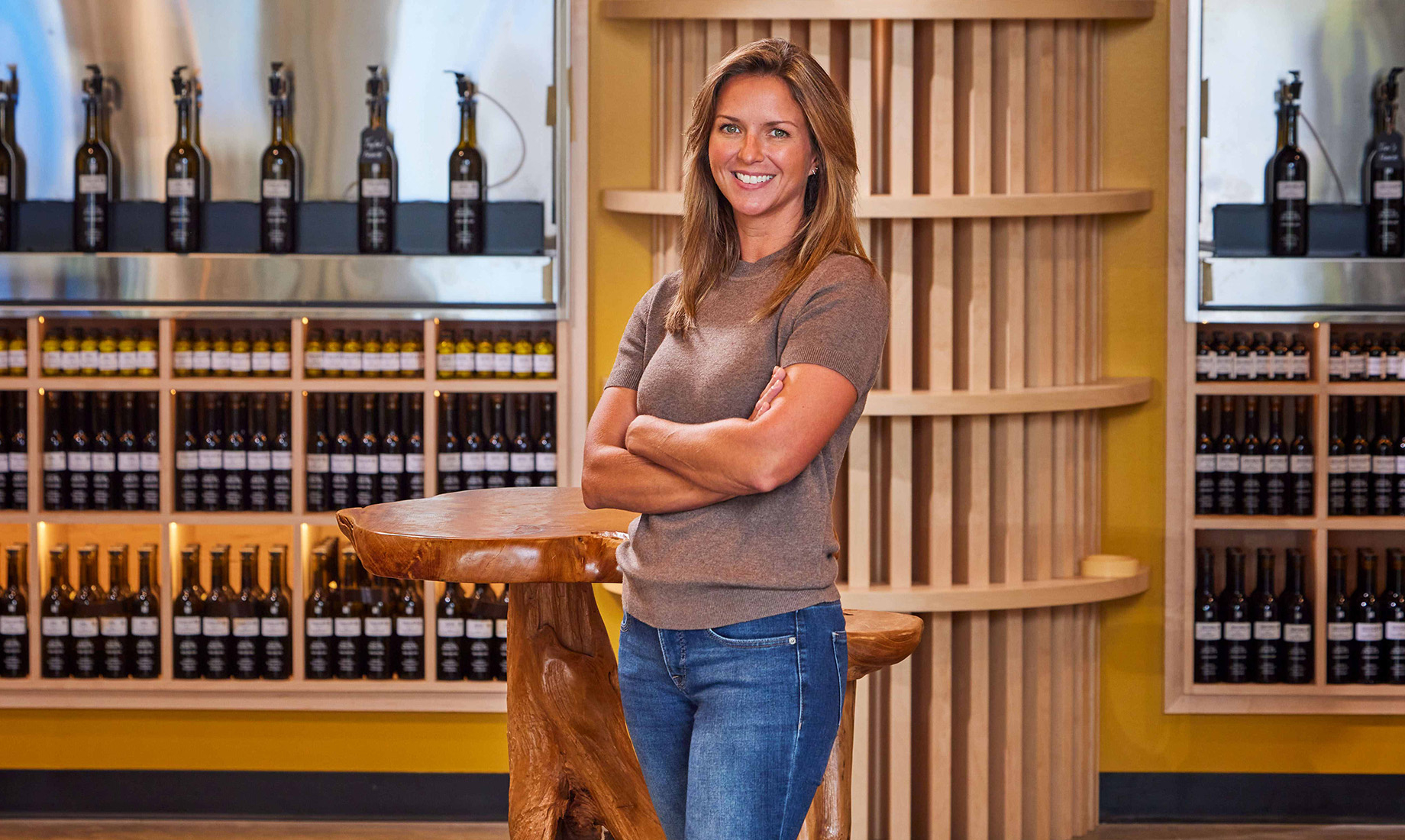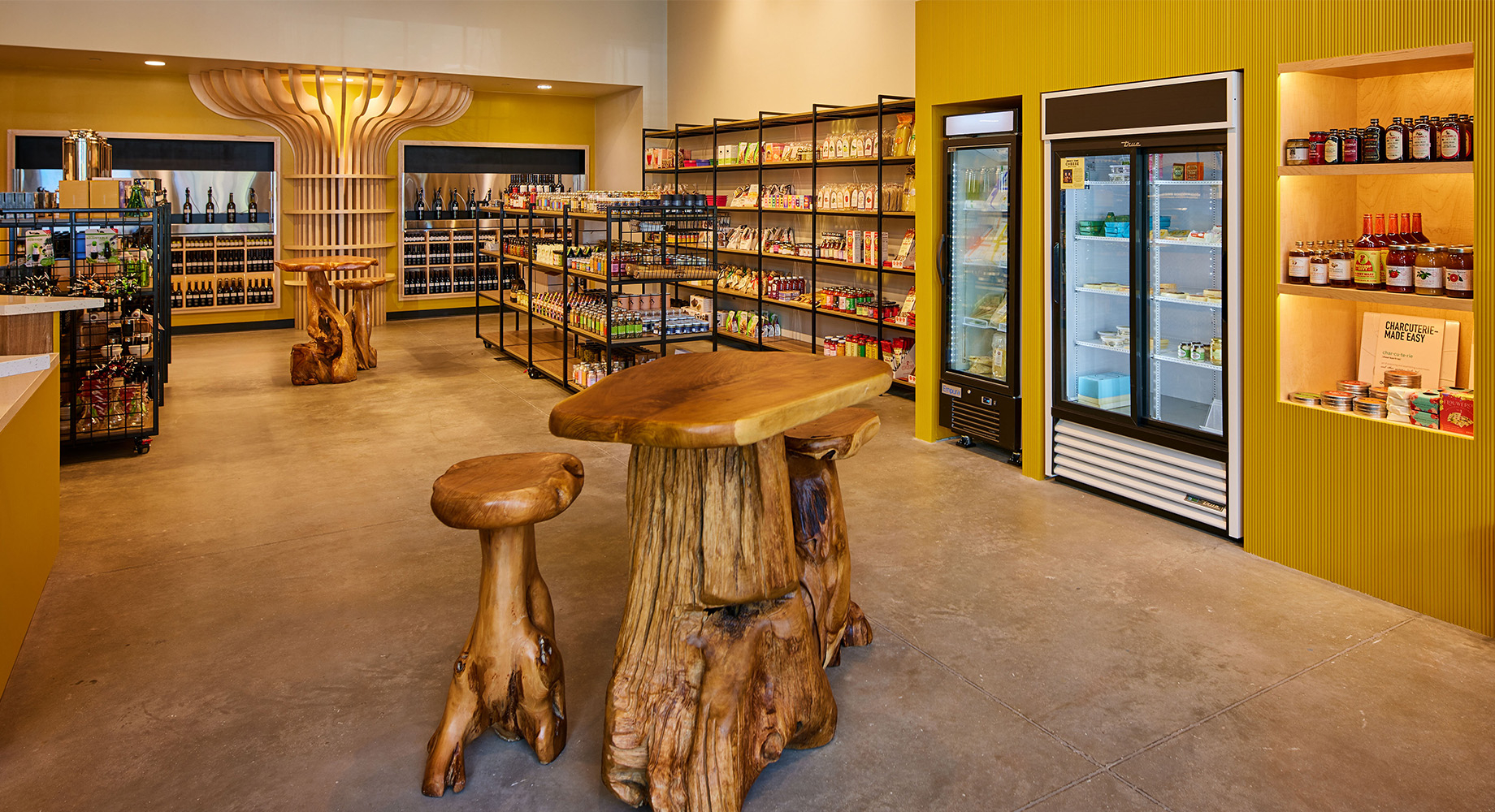Maggie Peterson has long been passionate about food, wellness and connecting with makers who share that commitment.
Born and raised in Oklahoma City, she spent summers in New England, where she was introduced to fresh, simple ingredients and met small-batch producers whose devotion to their craft left a lasting impression.
As an adult, her focus on health deepened. Reading food labels, she realized those authentic connections were harder to find — especially with a lack of what she calls “truth in labeling.” Extra virgin olive oil stood out in particular: Peterson noted that up to half of supermarket varieties are mislabeled or diluted.
Determined to bring quality, authenticity and education to her community, she trained as a sensory analyst and in 2012 opened The Oil Tree — a specialty shop focused on premium olive oils, aged balsamic vinegars and artisan foods. The store also hosts cooking and tasting classes designed to reconnect people with mindful eating and family traditions.
This summer, Peterson expanded with a second boutique at Oak, a new 20-acre mixed-use district in the heart of Oklahoma City. In this conversation with ICSC Small Business Center contributing editor Rebecca Meiser, she discusses building trust through quality, expanding into Oak and what it takes to thrive as a specialty retailer.

Maggie Peterson, owner of The Oil Tree, which now has two locations in Oklahoma City. Photos above and at top courtesy of Maggie Peterson
What helped your first store catch on with customers?
It took a couple of years before we really started making a profit. But once customers came in it was about giving them samples and creating an experience, not just saying: “Buy this jar and figure it out at home.” We showed them how to use the products and let them taste them. That’s when things really started to catch on.
In retail now, anyone can buy whatever they want online. But that personal connection to people is what’s missing. Really trying to relate to customers has been the winning aspect for us.
How do you draw customers in and keep them engaged?
We run cooking classes about once a month [during the summer], and during cooler months when more people are in town, two to three times a month. We have a resident chef, a local pasta maker, who leads classes. He walks through our monthly featured oil and vinegar pairings and cooks recipes using them. Then we’ll elaborate on different ways you can use the oil or vinegar — not just on a salad.
We also offer extra virgin olive oil tasting classes that dive into how it’s made, the chemistry aspect of it and sensory details. Sometimes customers bring in lower-quality brands and we compare them to show the difference. Olive oil is like fresh juice — it doesn’t expire in a week, but it does after about a year. Each variety has unique flavor notes, and it’s fun to explore their uses in baking, savory dishes or spicy foods.
Why are in-store experiences so central to your business?
It’s all about the experience. That’s why we opened in the first place: to connect with people, answer their questions and help them find quality foods.
[We want visitors to feel like] we care and are here for them. I mean, it’s a business. We have a bottom line, but at the end it’s not just about that.
What led you to open a second location, and how does the Oak store compare with the original?
We’d been searching for a while and tried different approaches. For example, a couple of years ago we did a 6-month pop-up downtown. But nothing felt quite right. Not long after that, I learned Oak had just started demolition, so I looked into it and called them about a year ago. I was blown away. It was being led by a local group, which is rare here, and they really understood what businesses like ours need.
Everything aligned perfectly. I loved their vision for the development. It’s experience-based, which matches exactly who we are. It just felt like, we have to do this. We’ll figure it out as we go.

The Oil Tree’s recently opened second location at the Oak, a mixed-use destination in Oklahoma City. Photo courtesy of Maggie Peterson
The new store [a 1,763-square-foot space] is laid out better. The original is massive — 5,500 square feet — and it’s great. It gives us more room and the ability to do all these classes, but at the same time it’s a lot of room to fill. The Oak location is smaller but designed better to make us more effective at selling and connecting to the customers.
How do the two locations serve customers differently?
[They are] only like a mile and a half away [from each other]. Everyone’s like: “Wow, you’re basically competing with yourselves.” But the original store is a destination. If you need something, you get in your car and drive there with intention. Oak [by comparison] is about foot traffic. People are going there to eat or for an event, with the goal of shopping and exploring. It’s a completely different dynamic, and I’m really excited to see how it plays out.
Right now, it’s more like: Can we prove this concept in a high-foot-traffic area? And if so, can we duplicate it and find other places like Oak?
It was funny. When customers started hearing that we were going to be over there, they’re like: “Are you closing [the original] store? Because we have to have that store.” I think people like the fact that you can drive and then leave, whereas with Oak we’re going to get customers that stumble on us. It will be interesting to see the purchasing patterns.
One of my favorite words is pivot. We’re open with no set expectations. We’ll see what people need, what they ask for and adapt.
“Can we prove this concept in a high-foot-traffic area? And if so, can we duplicate it and find other places like Oak?”
What’s something you wish you’d understood before launching The Oil Tree?
Growing up, my dad was in banking and oil and gas. Everything was always clear cut. It was about spreadsheets and numbers. If something wasn’t performing, it was done. That’s kind of how I went into this, but [owning your own retail store] is so different from that. It’s not so cut-and-dried. There’s a huge emotional component in your team, your customers and the business. I didn’t understand that fully when I went into it.
What did you learn from the way you launched your first store?
I’d worked in a few retail stores before, but I’d but never run a business. Opening Dec. 1 — right at the start of holiday shopping — was overwhelming. We somehow ended up on the front page of The Oklahoman. To this day, that was the biggest day we ever had, and it was our very first day. We had two people [working] in the store and I was like: “Oh my God.”
This time around we did a soft opening, which was a blessing. I was able to iron out kinks before the grand opening two weeks later. Even after doing this for almost 13 years, on soft-opening day I forgot to bring cash! It’s about ironing out the little things you don’t even realize you’re missing.
By Rebecca Meiser
Contributor, Commerce + Communities Today